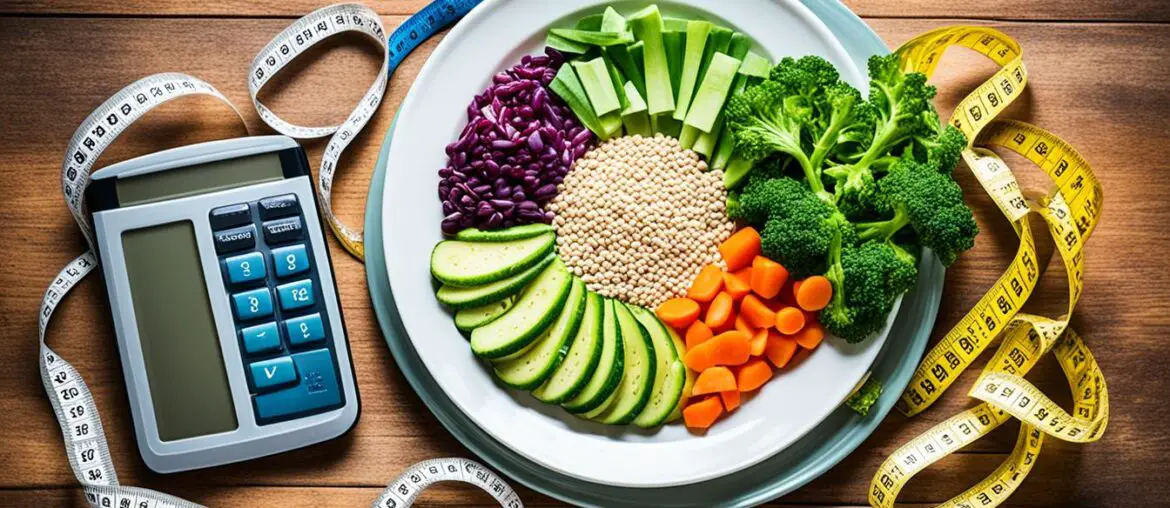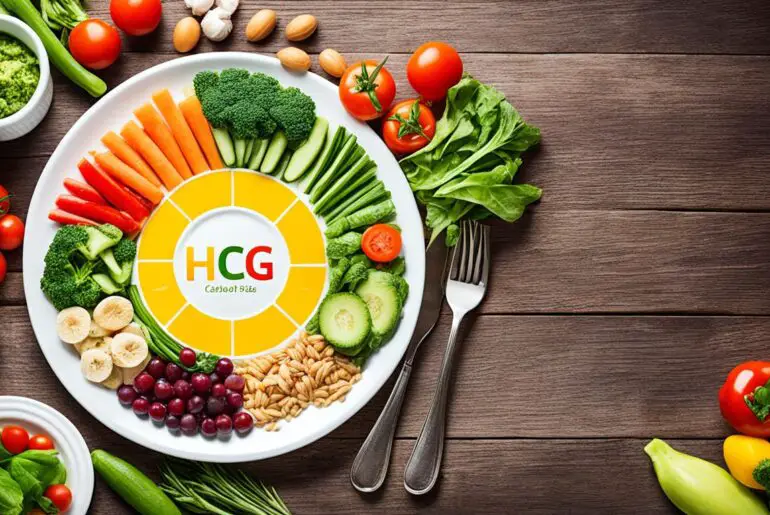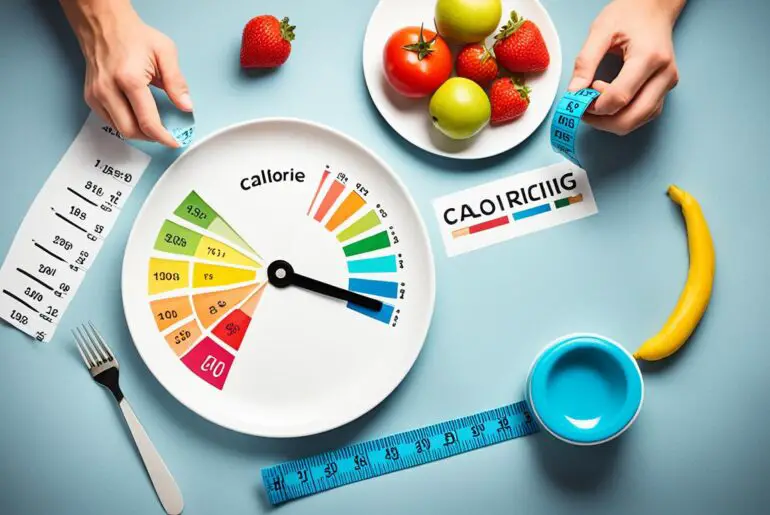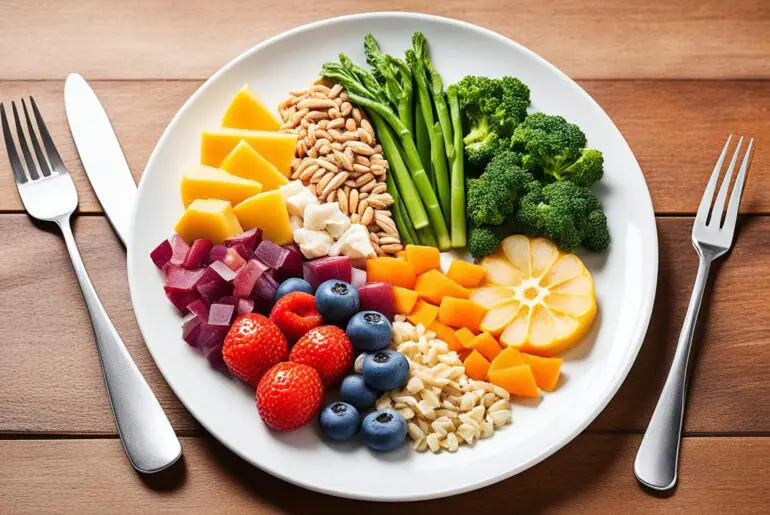Are you on a quest to shed those extra pounds quickly and effortlessly? The HCG diet has gained popularity as a rapid weight loss solution, claiming to help you lose weight without hunger. But is this diet plan too good to be true, or does it actually deliver on its promises? Let’s dig deeper into the optimal daily calorie intake on the HCG diet to separate fact from fiction.
Key Takeaways:
- The HCG diet combines HCG supplements or injections with an extremely low-calorie diet.
- During the weight loss phase, calorie intake is restricted to 500-800 calories per day.
- The HCG diet is not backed by scientific evidence and is considered unsafe by the FDA.
- The diet’s severe calorie restriction can lead to nutrient deficiencies and other side effects.
- There are safer and more sustainable alternatives for healthy weight loss.
The Science Behind the HCG Diet
The HCG diet is a weight loss program that claims to utilize the HCG hormone to boost metabolism and promote fat loss without causing hunger. However, scientific studies have consistently shown that the main factor contributing to weight loss on the HCG diet is the extreme calorie restriction, not the HCG hormone itself. The HCG hormone does not significantly reduce hunger or prevent muscle loss during weight loss.
During the HCG diet, calorie intake is restricted to a range of 500-800 calories per day. This low calorie intake can lead to decreased muscle mass and a slowing of the metabolism, making it difficult to maintain weight loss in the long term.
It is important to note that there is no scientific evidence supporting the effectiveness of the HCG hormone or the HCG diet for weight loss. The FDA has not approved HCG supplements or injections for weight loss, and considers their use illegal and unsafe. Health experts strongly discourage the use of the HCG diet as a safe or sustainable weight loss plan.
Body Composition and Metabolism
When following the HCG diet, the extreme calorie restriction can lead to a decrease in muscle mass. This is a significant concern, as muscle mass plays a key role in maintaining a healthy metabolism. Muscle tissue requires more energy to sustain than fat tissue, meaning that a higher muscle mass can help to increase the number of calories burned at rest. With a decrease in muscle mass, the body’s metabolism can slow down, making weight loss more difficult to achieve and sustain.
The Role of Calorie Restriction and Hunger
The main mechanism behind weight loss on the HCG diet is the severe calorie restriction. By drastically reducing calorie intake, the body is forced to use stored fat as an energy source, resulting in weight loss. However, this extreme calorie restriction can also lead to intense hunger and feelings of deprivation. This hunger can make it challenging to adhere to the diet and may contribute to disordered eating behaviors.
“The HCG diet is based on the theory that the HCG hormone can boost metabolism and promote fat loss without causing hunger.”
Overall, while the HCG diet claims to offer a unique approach to weight loss, the scientific evidence does not support its effectiveness. The extreme calorie restriction, rather than the HCG hormone, is responsible for weight loss on this diet. Furthermore, the low calorie intake and potential nutrient deficiencies associated with the HCG diet make it an unsafe and unsustainable weight loss program.
| Pros | Cons |
|---|---|
| May result in short-term weight loss | Extreme calorie restriction can lead to nutrient deficiencies |
| May provide short-term motivation for weight loss | Not supported by scientific evidence |
| May promote a structured approach to eating | May lead to muscle loss and a slowed metabolism |
The Three Phases of the HCG Diet
The HCG diet plan consists of three distinct phases that work together to achieve weight loss goals: the loading phase, the weight loss phase, and the maintenance phase.
Loading Phase
The loading phase is the initial stage of the HCG diet. During this phase, individuals are encouraged to consume high-fat, high-calorie foods for two days while simultaneously taking HCG supplements or injections. This loading phase aims to prepare the body for the subsequent weight loss phase by building up fat reserves.
Weight Loss Phase
The weight loss phase is the most crucial part of the HCG diet. It involves strict calorie restriction, with individuals consuming only 500-800 calories per day. The majority of these calories come from lean proteins, specific low-carbohydrate vegetables, limited fruits, and calorie-free drinks. This phase typically lasts for three to six weeks, depending on the individual’s weight loss goals.
To provide a visual understanding of the HCG diet’s allowed and restricted foods during the weight loss phase, here is a table illustrating the key food categories:
| Allowed Foods | Restricted Foods |
|---|---|
| Lean proteins (chicken, extra-lean beef, white fish, bison) | Dairy products (cheese, yogurt, ice cream, milk) |
| Specific low-carbohydrate vegetables (spinach, lettuce, broccoli, radishes) | High-carb foods (grains, bread, pasta, muffins) |
| Limited fruits (berries, citrus fruits, apples) | Fats and oils (salad dressings) |
| Approved seasonings (garlic, lemon juice, salt, pepper) | Sugary foods and beverages (soda, alcohol) |
| Approved drinks (coffee, tea, water sweetened with stevia or saccharin) | Sweets and desserts |
Maintenance Phase
The maintenance phase follows the weight loss phase and aims to stabilize and maintain the achieved weight loss. During this three-week period, individuals gradually increase their calorie intake while avoiding sugars and starches. It is important to note that HCG hormone supplementation is discontinued during this phase.
Now that we have explored the three phases of the HCG diet in detail, we can move on to understanding the approved foods on the diet in the next section.
Approved Foods on the HCG Diet
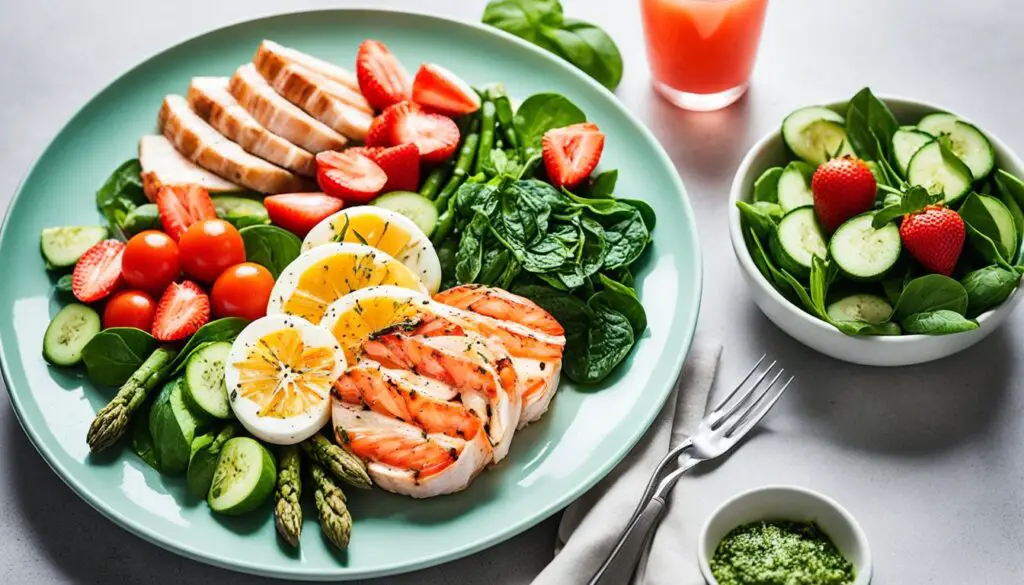
The weight loss phase of the HCG diet allows for specific foods that are approved and recommended. These foods provide essential nutrients while ensuring low calorie intake.
Lean Proteins
- Chicken
- Extra-lean beef
- White fish
- Bison
Low-Carbohydrate Vegetables
- Spinach
- Lettuce
- Broccoli
- Radishes
Limited Fruits
- Berries
- Citrus fruits
- Apples
Seasonings
- Garlic
- Lemon juice
- Salt
- Pepper
Approved Drinks
- Coffee (sweetened with stevia or saccharin)
- Tea (sweetened with stevia or saccharin)
- Water
Important note: Milk is limited to one tablespoon per day.
These approved foods offer a variety of options to add flavor and nutrients to your meals while adhering to the HCG diet guidelines. Keep in mind that portion sizes and calorie counts should be carefully monitored to maintain the desired calorie intake for optimal weight loss.
Below is an image depicting some of the approved foods on the HCG diet:
Foods to Avoid on the HCG Diet
When following the HCG diet, it is important to avoid certain foods that can hinder your weight loss progress. By eliminating these foods from your diet, you can maximize the effectiveness of the HCG hormone and achieve better results. The key foods to avoid on the HCG diet include:
- Dairy Products: Cheese, yogurt, ice cream, and additional milk should not be consumed while on the HCG diet. These products are high in fat and can contribute to weight gain.
- High-Carb Foods: Grains, bread, pasta, and muffins are high in carbohydrates and should be strictly avoided. These foods can cause blood sugar spikes and hinder weight loss.
- Fats and Oils: Fats and oils, including salad dressings, should be eliminated from your diet. These high-fat foods can hinder the fat-burning process and slow down your weight loss progress.
- Sugary Foods: Foods high in sugar, such as candies, cookies, and pastries, should be completely eliminated. These sugary treats can sabotage your weight loss efforts and cause energy crashes.
- Beverages: Sodas, fruit juices, alcohol, and other sugary beverages should be avoided. These drinks are high in calories and can hinder your progress on the HCG diet.
- Sweets and Desserts: Desserts like cakes, pies, and chocolates should be eliminated from your diet. These sweet treats can derail your weight loss goals and contribute to cravings.
By avoiding these foods, you can create a calorie deficit and optimize the fat-burning process while on the HCG diet. It is important to stay committed to the program and make healthy choices to achieve the desired weight loss results.
Safety and Side Effects of the HCG Diet
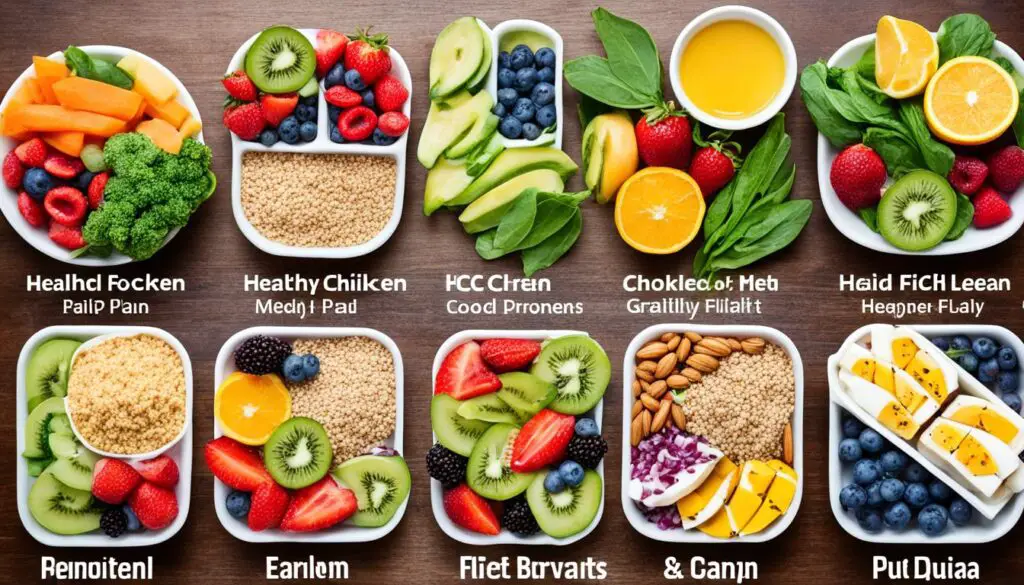
The HCG diet is considered unsafe and illegal according to the FDA. HCG products sold for weight loss are unregulated, potentially containing unknown ingredients. The severe calorie restriction of the diet can lead to various side effects, including headaches, fatigue, and depression. The limited food choices on the diet also raise concerns about nutrient deficiencies. In some cases, serious adverse reactions such as blood clots and cardiac issues have been reported. Health experts strongly discourage the use of the HCG diet for weight loss.
In recent years, the FDA has issued a warning regarding the safety and efficacy of HCG products for weight loss. These products are not approved by the FDA and are considered illegal. Despite these warnings, some individuals still turn to the HCG diet in search of quick weight loss results. However, it’s important to understand the potential risks and dangers associated with this diet.
The severe calorie restriction imposed by the HCG diet can have serious consequences for both physical and mental health. The extreme hunger caused by the low-calorie intake can lead to feelings of deprivation and may trigger disordered eating behaviors. This can include binge eating episodes or a preoccupation with food and weight.
Additionally, the HCG diet’s restricted food choices can result in nutrient deficiencies, as essential vitamins, minerals, and other nutrients may be lacking. This can lead to fatigue, weakness, and impaired immune function, among other health problems.
Furthermore, the use of illegal HCG products for weight loss poses additional risks. These products are not regulated, meaning their safety and efficacy cannot be guaranteed. The ingredients in these products are often unknown and may interact with medications or have unknown side effects.
| Side Effects of the HCG Diet | Warnings and Concerns |
|---|---|
|
|
|
|
|
|
In conclusion, the HCG diet is an unsafe and potentially harmful weight loss approach. The severe calorie restriction, limited food choices, and use of illegal HCG products pose significant health risks. Health experts strongly discourage the use of this diet and recommend pursuing healthy, sustainable weight loss strategies instead.
The Effectiveness of HCG for Weight Loss
When it comes to weight loss, the HCG diet has gained popularity for its claim to promote rapid results. However, scientific studies have consistently shown that the weight loss achieved on the HCG diet is not due to the HCG hormone itself, but rather the extreme calorie restriction that accompanies the diet.
Several studies comparing HCG injections to a placebo have found no significant difference in weight loss between the two groups. This suggests that the HCG hormone does not play a direct role in promoting weight loss. Instead, it is the calorie restriction that leads to the initial drop in pounds.
Furthermore, the HCG hormone does not prevent muscle loss or boost metabolism, as some proponents of the diet claim. In fact, extremely low-calorie diets like the HCG diet can actually lead to muscle loss and metabolic slowdown, making it difficult to maintain weight loss in the long term.
It is important to note that the placebo effect may contribute to the perceived effectiveness of the HCG diet. When individuals believe they are receiving a treatment that will lead to weight loss, they may experience psychological effects that contribute to their reported results.
“Scientific studies have consistently shown that the weight loss achieved on the HCG diet is solely due to extreme calorie restriction, not the HCG hormone.”
While the HCG diet may result in initial weight loss, it is important to consider the potential risks and long-term implications. The extreme calorie restriction and lack of balanced nutrition can lead to nutrient deficiencies and other adverse effects on overall health.
In summary, the effectiveness of HCG for weight loss lies in the severe calorie restriction rather than the HCG hormone itself. However, the long-term sustainability and safety of the HCG diet are questionable, making it important to explore alternative, healthier approaches to weight loss.
The Cost and Availability of HCG Products
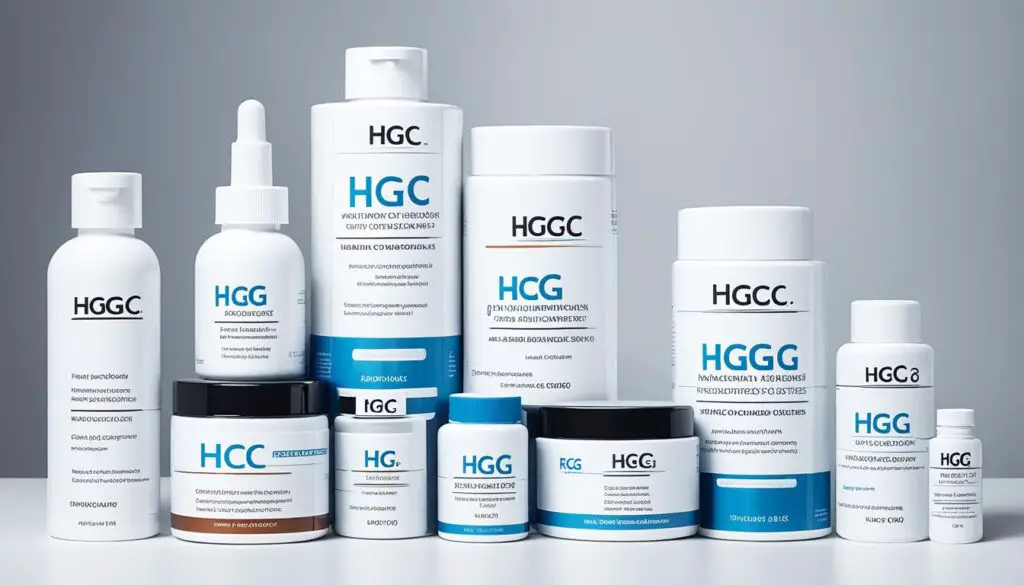
When it comes to HCG products for weight loss, it’s important to understand their legality and availability. Unfortunately, HCG products are illegal and not approved by the FDA for weight loss purposes. This means that any over-the-counter HCG products labeled as homeopathic are not regulated and do not contain real HCG. Therefore, they cannot be considered as reliable options for weight loss.
Prescription HCG injections, on the other hand, can only be obtained through a doctor. However, it’s important to note that these injections are primarily used for fertility treatments and not for weight loss. The restricted availability of HCG injections and their illegal status for weight loss contribute to their higher cost compared to other weight loss methods.
While the cost of HCG injections can vary depending on various factors, including dosage and treatment duration, they can be expensive. This is partly due to their limited availability and the fact that they are not approved for weight loss by the FDA. It’s important to carefully consider these factors before deciding to pursue HCG injections as a weight loss method.
| Pros | Cons |
|---|---|
| – May be obtained through a doctor | – Illegal for weight loss purposes |
| – Potential availability for fertility treatments | – Not regulated or approved by the FDA |
| – Potential effectiveness for specific medical conditions | – Expensive due to limited availability and illegality for weight loss |
Considering the legality and cost of HCG products, it is important to prioritize safety and explore alternative weight loss methods that are approved by medical professionals and backed by scientific evidence.
Hunger and Disordered Eating on the HCG Diet
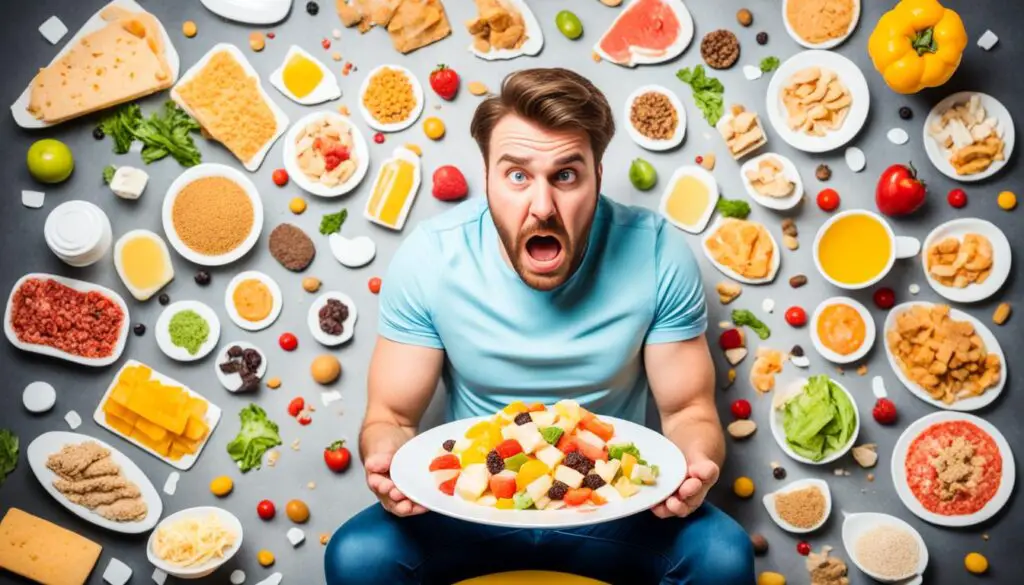
Hunger is a common and intense side effect experienced by individuals on the HCG diet, primarily due to the severe calorie restriction imposed during the weight loss phase. The restricted calorie intake of 500-800 calories per day can lead to extreme hunger, making it challenging to adhere to the diet plan.
The intense hunger experienced on the HCG diet can have detrimental effects on an individual’s eating behaviors, potentially leading to disordered eating patterns. The restriction and deprivation imposed by the diet may trigger episodes of binge eating, where individuals consume large quantities of food in a short period of time. This unhealthy cycle of restriction and overeating can further worsen an individual’s relationship with food and perpetuate a dangerous cycle of weight loss and regain.
The HCG diet’s unsustainable nature, coupled with the intense hunger experienced, can contribute to the development of disordered eating behaviors and an unhealthy mindset towards food. It is essential to prioritize one’s physical and mental well-being over rapid weight loss and consider healthier, more sustainable alternatives for achieving a healthy body weight.
Nutrient Deficiencies and Safety Concerns
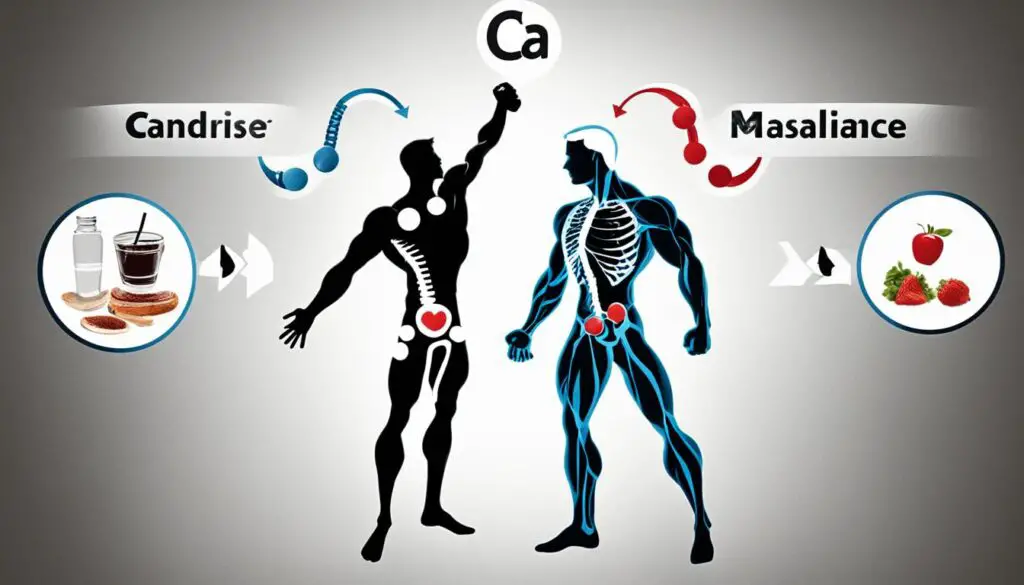
The HCG diet’s extreme calorie restriction can have serious implications for nutrient deficiencies. The diet restricts certain food groups, leading to potential deficiencies in essential vitamins and minerals.
Specifically, nutrient deficiencies may arise in B vitamins, fiber, and fat-soluble vitamins such as vitamins A, D, E, and K. These deficiencies can have detrimental effects on overall health and wellbeing, impairing various bodily functions and potentially leading to long-term health issues.
Furthermore, safety concerns surround the HCG diet. The U.S. Food and Drug Administration (FDA) has issued a warning about the safety of HCG products for weight loss. The FDA has deemed HCG supplements or injections for weight loss as illegal and unsafe, highlighting serious adverse reactions and a lack of scientific evidence supporting their efficacy. The use of unregulated HCG products may pose unforeseen risks to individuals following the diet.
It is essential to consider the possible risks associated with the HCG diet. By subjecting the body to such severe calorie restriction, individuals may be predisposed to the development of other serious diseases, including cancer, diabetes, and heart disease.
Considering the nutrient deficiencies and safety concerns surrounding the HCG diet, it is crucial to prioritize safe and sustainable weight loss methods that are supported by scientific evidence and endorsed by healthcare professionals.
Conclusion
The HCG diet is not recommended by health experts as a safe or sustainable weight loss plan. It poses safety concerns, lacks scientific evidence, involves extreme calorie restriction, and may lead to nutrient deficiencies. While the diet claims to be effective due to the HCG hormone, scientific studies have consistently shown that weight loss on the HCG diet is solely attributed to drastic calorie reduction.
There are much healthier and more sustainable alternatives for weight loss. It is crucial to consult with a healthcare professional or registered dietitian before starting any diet plan. Prioritizing long-term health and well-being over rapid weight loss should be the primary goal. Making lifestyle changes, adopting a balanced diet, and incorporating regular physical activity are key factors in achieving and maintaining healthy weight loss.
Remember, there is no magic solution or quick fix for weight loss. It is a journey that requires patience, perseverance, and a comprehensive approach to overall well-being. By focusing on healthy eating habits, portion control, and regular exercise, you can achieve your weight loss goals in a sustainable and safe manner.
FAQ
What is the HCG diet?
The HCG diet is a weight loss program that combines the use of HCG supplements or injections with an extremely low-calorie diet.
What are the three phases of the HCG diet?
The HCG diet consists of three phases: the loading phase, the weight loss phase, and the maintenance phase.
What foods are allowed on the HCG diet?
Approved foods on the HCG diet include lean proteins, specific low-carbohydrate vegetables, limited fruits, and calorie-free drinks.
What foods should be avoided on the HCG diet?
Foods to avoid on the HCG diet include dairy products, high-carb foods, fats and oils, sugary foods and beverages, and sweets and desserts.
Is the HCG diet safe?
The HCG diet is considered unsafe and illegal by the FDA due to potential side effects and lack of scientific evidence supporting its efficacy.
Does the HCG hormone promote weight loss?
Scientific studies have shown that weight loss on the HCG diet is due to extreme calorie restriction, not the HCG hormone itself.
How much do HCG products cost?
The cost of HCG injections varies but can be expensive due to their restricted availability and illegal status for weight loss.
Does the HCG diet cause hunger?
Hunger is a common side effect of the HCG diet due to the severe calorie restriction.
Can the HCG diet lead to nutrient deficiencies?
The HCG diet’s restricted food choices can lead to nutrient deficiencies, particularly in B vitamins, fiber, and fat-soluble vitamins.
Is the HCG diet an effective weight loss plan?
The HCG diet’s effectiveness is solely attributed to drastic calorie reduction, not the HCG hormone. There are safer and more sustainable alternatives for weight loss.

